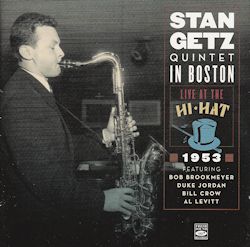
BUY NOW AmazonUK AmazonUS |
STAN GETZ QUINTET
Live At The Hi-Hat 1953
|
CD1
Ornithology
Move
These Foolish Things
Hymn To The Orient
Woody 'n' You
Indiana
Moonlight In Vermount
CD2
There Will Never Be Another You
Spring Will Be A Little Late This Year
Sweetie Pie
Show Me The Way To Go Home/Goodnight Sweetheart
Stella By Starlight
All The Things You Are
Darn That Dream
Stan Getz - Tenor sax
Bob Brookmeyer - Valve trombone
Duke Jordan - Piano
Bill Crow - Bass
Al Levitt - Drums
It's always interesting to hear jazz musicians at a comparatively early stage of their development and to compare the quality of their performance with what came later. Stan Getz was only 26 when this recording was made during one of his visits to the Hi-Hat club in Boston, soon after the formation of the Getz quintet in early 1953. Getz was hardly a novice, however, having left school initially to tour as a sideman with Jack Teagarden (1943) and in due course, forming part of the Stan Kenton, Jimmy Dorsey, Benny Goodman and Woody Herman bands. He had made his first recording at only 16 and his first under his own name at 19. From late 1949, Getz led his own quartet which included pianist Al Haig. Subsequently this quintet was established, and another significant talent in valve trombonist Bob Brookmeyer, himself still in his early 20s, was brought into the limelight. Maybe Getz had already shown what he was capable of in that sublime Early Autumn solo with Woody Herman, but this live quintet recording, in his case, is more about exceptional promise than mature delivery. Getz and Brookmeyer are joined here by New Yorkers Duke Jordan on piano and Al Levitt on drums plus Bill Crow, who had arrived in the city in 1950, on bass.
The choice of material on these two CDs, as ever with Getz, is impeccable. The first disc features pieces by Charlie Parker, Denzil Best, Duke Jordan and Dizzy Gillespie, plus three familiar standards. Move, forever associated in my mind with the Miles Davis Birth Of The Cool CD, receives a stirring treatment here. Getz and the swinging Brookmeyer integrate seamlessly. The tenor solo weaves in and out of the theme while simultaneously treating us to a snatch of The Minute Waltz at one point and Let's Fall In Love at another. Stan's typically airy and melodic approach to These Foolish Things, coupled with a laid-back Brookmeyer, is equally satisfying. By contrast, Indiana provides scope for a more hard-hitting approach from the two lead musicians as well as the rhythm section. Moonlight In Vermont has some neat interplay between Getz and Brookmeyer but it is the tenor player Getz who dominates on this familiar standard.
The second CD has less in the way of stand-out material. There are five standards, a Getz original and a distinct curiosity, namelyShow Me The Way To Go Home in tandem withGoodnight Sweetheart. The pick of the bunch areThere Will Never Be Another You and Spring Will Be A Little Late This Year. On the former, pianist Duke Jordan gets an extended opportunity to show what he can do while the tenor/valve trombone partnership again hits pay dirt. Spring Will Be A Little Late This Year is a breezy number delivered in the West Coast style, à la Gerry Mulligan. Sweetie Pie, a Getz-Loeb composition, strikes me as fairly ordinary material redeemed by the quality of the solo performances. The rest of the tracks are easy on the ear but otherwise unremarkable.
Some final comments, then. My understanding is that Duke Jordan was later to leave the group because he felt he had insufficient time as a soloist. To be fair, that would not be borne out by this recording. One thing that is apparent is that he does seem to be under-recorded. At times the sound from the piano is decidedly tinny which, of course, does this fine pianist no favours. The rest of the rhythm section are essentially there for support. It is Getz and Brookmeyer who hold centre stage. I thought Brookmeyer was consistently good. Getz was destined for future greatness and what we have here are glimpses of what was to come from him when in his prime.
James Poore